Book contents
- Participation in the Divine
- Cambridge Studies in Religion and Platonism
- Participation in the Divine
- Copyright page
- Contents
- Contributors
- Foreword
- Acknowledgements
- Introduction
- 1 The Lord Is One
- 2 The Place and Scope of Participation in the Divine in the Thought of Plato
- 3 Origen on Participation
- 4 Forms, Intellects, and Angels
- 5 Participation in the Divine in Gregory of Nyssa
- 6 Augustine’s “Illumination” Theory as the Natural Participation of the Human Mind
- 7 The Principle of Cosmic Unification in the Athenian School of Platonism
- 8 St. Maximus the Confessor on Participation
- 9 Participation in Medieval Platonism
- 10 Participation as God’s Indwelling
- 11 Some Late Medieval Discussions of Participation in the Divine
- 12 Music, Temperance, and Participation in Marsilio Ficino
- 13 Richard Hooker’s Metaphysics of Divine Participation
- 14 The Transcendence of Holiness
- 15 Ralph Cudworth on Causality and Substantial Forms
- 16 The Romantic Legacy
- 17 Participation Revived and Revised
- Index
- References
13 - Richard Hooker’s Metaphysics of Divine Participation
Published online by Cambridge University Press: 23 November 2024
- Participation in the Divine
- Cambridge Studies in Religion and Platonism
- Participation in the Divine
- Copyright page
- Contents
- Contributors
- Foreword
- Acknowledgements
- Introduction
- 1 The Lord Is One
- 2 The Place and Scope of Participation in the Divine in the Thought of Plato
- 3 Origen on Participation
- 4 Forms, Intellects, and Angels
- 5 Participation in the Divine in Gregory of Nyssa
- 6 Augustine’s “Illumination” Theory as the Natural Participation of the Human Mind
- 7 The Principle of Cosmic Unification in the Athenian School of Platonism
- 8 St. Maximus the Confessor on Participation
- 9 Participation in Medieval Platonism
- 10 Participation as God’s Indwelling
- 11 Some Late Medieval Discussions of Participation in the Divine
- 12 Music, Temperance, and Participation in Marsilio Ficino
- 13 Richard Hooker’s Metaphysics of Divine Participation
- 14 The Transcendence of Holiness
- 15 Ralph Cudworth on Causality and Substantial Forms
- 16 The Romantic Legacy
- 17 Participation Revived and Revised
- Index
- References
Summary
In the fourth book of his treatise Of the Lawes of Ecclesiasticall Politie (1593), Richard Hooker affirms a conspicuously positive role for the function of the lower, sensuous faculties of the soul in the religious life. Hooker paraphrases the sixth-century Syrian Neoplatonic theologian Pseudo-Dionysius the Areopagite when he observes that “the sensible things which religion hath hallowed are resemblances framed according to things spiritually understood, whereunto they serve as a hand to lead and a way to direct.” The phenomena of human aesthetic experience are understood here as “resemblances” of their original “causes,” and “participation” (μέθεξις) works in both directions: Hooker speaks of the various species of law as “ofspringe of god, they are in him as effects in their highest cause, he likewise actuallie is in them, thassistance and influence of his deitie is theire life” (Lawes v.56.5; 2:237.23–25).1
- Type
- Chapter
- Information
- Participation in the DivineA Philosophical History, From Antiquity to the Modern Era, pp. 292 - 302Publisher: Cambridge University PressPrint publication year: 2024

